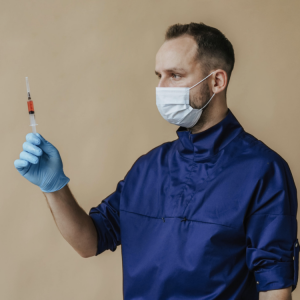Hot Shot: What You Need To Know About COVID Vaccines

Hot Shot: What You Need To Know About COVID Vaccines
December 16, 2020
So it looks like we’re at the beginning of the end…or, are we at the end of the beginning? There’s no doubt that the arrival of safe and effective vaccines for COVID-19 is an unprecedented scientific breakthrough that will potentially save an untold number of lives and prevent serious illness in millions more. But is this the light at the end of the coronavirus tunnel? Or are we just beginning a new phase of the pandemic, whose outcome will depend on all of us playing our part to vanquish this terrible disease? Whether we’ll be successful and able to return to some level of normalcy and our pre-pandemic lives remain to be seen. First, enough of us have to become vaccinated. For previous agebuzz reporting on the COVID vaccine, click here.
Regarding the vaccine itself, this much we know: Two vaccines, one from Pfizer and the other from Moderna, have now received (or are about to receive) Emergency Usage Authorization from the FDA, meaning they can now be used for inoculation of the population. For an explanation of the revolutionary nature of these new vaccines and how they work, roll up your sleeve and read the CDC explanation here. It’s important to underscore that neither of these vaccines works by actually injecting the coronavirus into you, so you cannot get COVID from being inoculated with one of these vaccines. You may experience a side effect, however, from receiving the vaccine, including a sore arm, headache, fever, chills, or fatigue, and are more likely to experience this after the second shot. But as the experts underscore, this is not a problem with the vaccine, it’s actually a positive sign that your body is reacting, which is what we want to happen when you are inoculated. Serious side-effects from the vaccine to date have been rare, and the CDC has issued guidelines for those who may be concerned about an allergic reaction (most can still receive the vaccine). One important point to note: both authorized vaccines require 2 shots, and for now, it’s important that both of your shots contain the vaccine from the same manufacturer.
But some of us may be “vaccine skeptics,” ie, we may need to know more before we’re ready to get in line. We have questions: For example, Should I get the vaccine if I’ve already had COVID? (yes); Do the vaccines work in older adults? (they appear to work as well in older adults as for younger ones, but more data is needed for those over 80); Does the vaccine actually prevent you from becoming infected, or just prevent serious symptoms in those vaccinated? (we don’t yet know if the vaccine actually prevents infection itself); Will I still need to wear a mask if I get the vaccine? (Definitely yes, for the foreseeable future until enough of us have been vaccinated).
As for getting us back to normal, that’s definitely going to take a while longer. While approximately 60% of us have said in surveys we will definitely or probably get vaccinated, we actually need closer to 70-75% of the population to be vaccinated before we can return to some level of normalcy in our activities. And right now, about 20% have said they’re pretty sure they won’t get vaccinated, which is a big concern. In fact, Dr. Fauci has said this is his biggest concern, stating, “My primary biggest fear is that a substantial proportion of the people will be hesitant to get vaccinated. I think there are going to be many people who don’t want to get vaccinated right away. ” There are even estimates that 46% of older adults want to wait and see before agreeing to be vaccinated. Research suggests that willingness to be vaccinated breaks down along political party lines, geography, and race, which isn’t helped by the rampant mistrust of government and our institutions. The hope is that enough of us can be convinced to overcome whatever hesitancy we have and that the right messaging can be developed to dispel the misinformation and scams that are pervasive on social media and in certain media outlets. If we have any hope of returning to a pre-pandemic state of affairs (at least concerning health risks), it’s going to take the majority of us working together for the common good to get us over the finish line.







